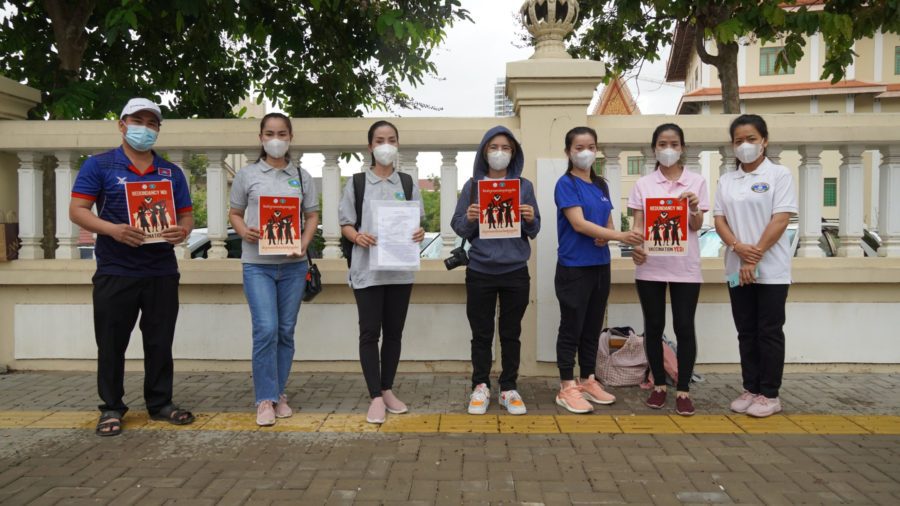A NagaWorld union representative said the Arbitration Council refused to adjudicate on the validity of the mega casino’s decision to layoff more than 1,300 workers, with a labor advocate saying the council wants a labor inspection procedure to decide the matter.
Chhun Sokha, deputy president of the NagaWorld union, said on Friday that the Arbitration Council’s ruling on whether to stop the mass layoffs at the casino and other issues related to payments and severance paid to workers was to refuse to consider the union’s demand to stop the planned layoffs.
“For me, I think it is very difficult to accept what is involved in this decision,” Sokha said. “In general, in Cambodia, we know that the arbitrator has the right to decide or work to resolve disputes.”
The other rulings directed the casino to correctly calculate seniority pay, unused annual leave and indemnity payments.
NagaWorld announced the termination of more than 1,300 workers of its more than 8,000-strong workforce — a move unionists said was an attempt at union-busting because the terminations included the senior leadership.
When talks failed, the casino started sending compensation packages to workers who were being terminated — many of whom accepted the money because of the harsh economic stress caused by the Covid-19 pandemic.
Khun Tharo, an officer at labor rights groups Central, said the council refused to rule on the validity of the dismissals and punted the decision to the Labor Ministry’s inspectorate.
“But the important thing is how the procedure of the labor inspector will be decided,” he said. “Because so far, there has been no decision from the labor inspectorate.”
Earlier this week, Chhim Sithar, who heads the NagaWorld union and has also been terminated, said the number of holdouts had shrunk to 373 and that she could not blame workers for accepting the casino’s termination packages.
She said if the senior leadership of the union was terminated it would be hard for the remaining 6,000-odd workers to organize.
“Most important [for us] is the presence of the union. The workers need the union and this is not the first time NagaWorld tried to get rid of the union, so we cannot allow the company to get rid of the union,” she said.
The International Labor Organization said it was closely following the case, and allegations were being considered by its committee on freedom of association. It could not comment while its investigation was ongoing.
“The allegations referred to are sub judice before the competent ILO supervisory bodies, including the Committee on Freedom of Association,” it said. “The ILO is closely following this and will take action in relation to this case as soon as it receives from the union of the affected workers a request detailing the circumstances of the case.”
The ILO’s main office in Geneva has sent a letter to the Labor Ministry after the NagaWorld union’s international partner — International Union of Food, Agricultural, Hotel, Restaurant, Catering, Tobacco and Allied Workers’ Associations — filed a complaint. Labor Minister Ith Samheng said in response that the ministry was involved, but claimed that “laying off some employees is the only option for Naga World.”
Reacting to the minister’s comments, Sithar said the minister sounded like a lawyer for NagaWorld. “How come the Minister of Labor is very confident to say that NagaCorp has only this option to layoff?”
NagaCorp had been reviewed once before by ILO’s oversight bodies on freedom of association in 2010, responding to the company’s decision to fire the union’s 14 leaders at a time when disputes between the two parties were ramping up.
At the time the ILO committee reviewed the layoffs, Cambodia’s Arbitration Council had deemed that the union leaders could request to nullify their termination contracts, which the union claimed was signed by the leaders while they were being pressured by the company. Four of the 14 leaders did so, but NagaCorp filed a complaint against the Arbitration Council’s decision, saying it couldn’t be forced to rehire the workers. The ILO committee simply asked the government to keep it informed of the process, noting that union-busting tactics should not be tolerated.
William Conklin, country director for the labor organization Solidarity Center, said providing evidence that a company was attempting to dismantle a union would have already been difficult, but the company now has the excuse of the global pandemic and ensuing closures and financial hardships.
He noted that ILO complaints have no way to hold NagaCorp accountable for its actions as a company, but if deemed necessary, could offer a pressure point on the Cambodian government to hold companies like NagaCorp to higher standards.
“The whole idea is if this is held up, and the U.S. or E.U. picks it up and says, ‘You have an issue, this is an example why we can’t continue [trade] or dont want to renew GSP or EBA,’” he said, referring to the U.S.’ generalized scheme of preferences and the E.U.’s Everything But Arms trade privileges, respectively.













